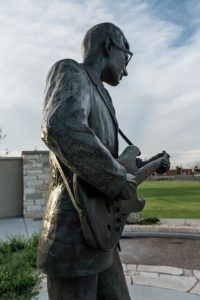
A statue of rock-‘n’-roll legend Buddy Holly, the centerpiece of a walk of fame that honors other West Texas musicians in Holly’s hometown of Lubbock, Texas. Across the street is a museum devoted to Holly, born Charles Hardin Holley, was killed along with singers Richie Valens and “The Big Bopper” Richardson in the plane crash in 1959. The event was dubbed “The Day the Music Died” in Don McLean’s song “American Pie.”
In National Review, Jeffrey Blehar examines Buddy Holly’s influence on generations of rock and roll that have followed. Blehar writes (abridged):
Holly first came to fame with “That’ll Be The Day,” the song whose refrain (“That’ll be the day-hey-hey when I die”) McLean hinges his entire thumbnail history of rock around. The song was a revelation to the country, and a notable step forward for Holly himself. He had been playing in public since 1952 and formed a duo with his friend (Buddy & Bob, whose few recordings reveal a remarkable country-folk origin to Holly’s sound). But it was opening for the young, fiery Elvis Presley during his swing through west Texas in 1955 that truly galvanized Holly. Think about it for a second: Imagine being a young Buddy Holly, and you are opening for Sun Studios-era Elvis Presley. It would be like witnessing a meteor strike from ten yards.
The effect on Holly was instant and can be traced delightfully throughout his recordings during these years. His country becomes rockabilly, and that hiccupping rockabilly soon begins to mutate into a unique early fusion of pop, rhythm & blues, and country: In other words, to listen to Holly is to hear a founding strand of rock and roll being born. After an unsatisfying detour in Nashville where he lacked creative control, the young man from Lubbock, Texas, decided to return to the West instead, to Clovis, N.M., of all places. There he would work with a producer named Norm Petty whose serendipitous penchant for crystal-clear recording techniques was matched by his willingness to develop new ones as well. The “vocal overdub,” where a singer harmonizes with himself? Buddy Holly and Norm Petty invented it in 1957 when Holly wanted to duet with himself on a new song he had written called “Words Of Love.”
From that moment onward, Holly wasn’t just writing some of the most explosive music of the early rock era (it will always amuse me that “Not Fade Away,” perhaps one of the most iconic rock songs ever written, was the B-side of a single). He and Petty were also shaping — in a very real sense creating out of nothing — the earliest contours of modern studio-recording technique, employing overdubs and introducing non-standard instruments like celestes (on the unforgettably simple “Everyday”) or strings to back Holly’s band, the Crickets. Listen to the paradiddle rhythms of “Peggy Sue” as they bob and duck in and out of the mix. It immediately catches your attention on a subconscious level, and that’s the trick. That’s why listeners in America noticed it as well.
And not just in America. To be clear: The most important case for Buddy Holly’s greatness is made by his own music. (If you don’t feel invigorated hearing Buddy sing “All my love! All of my kissin’!/You don’t know what you’ve been missing, oh boy!” then we simply misunderstand one another.) But the case for Holly’s historical importance is proven by his influence on a later generation of British musical groups who kept alive his spirit of independence, self-determination, and fearless (almost naïve) musical intelligence.
For those who haven’t already figured out where I’m heading here, then let me explain that the first-ever recording made by three teenagers from Liverpool in 1958 was, in a stroke of glorious cosmic alignment, a cover of Buddy Holly’s “That’ll Be The Day.” Those kids — John Lennon, Paul McCartney, and George Harrison — were merely known as the Quarrymen back then, but because they were so fiercely inspired by Holly, they would change their name to the Beatles after his death as a tribute to the Crickets and their self-contained ethos. The Beatles based their internal order on what they perceived Holly and the Crickets to stand for, and a thousand other groups then based themselves on the Beatles. Thus was the template for almost all future rock music set down as a bible of How To Do It Right, and all as an echo of what Buddy Holly accomplished during his brief but blazingly bright career.
So it’s altogether too fitting (and eerily coincidental given how both were cut down) that Buddy Holly and John Lennon’s careers, each documented by Don McLean in “American Pie,” both truly begin by singing the very same words that first made Holly a star, and provided his epitaph: “That’ll be the day when I die.”
Read more here.
If you’re willing to fight for Main Street America, click here to sign up for my free weekly email.




